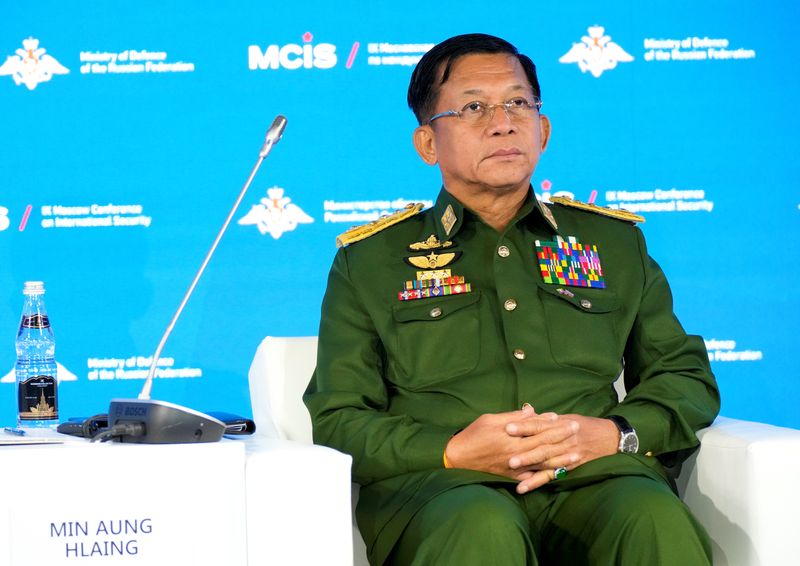International arrest warrant for Gen Min Aung Hlaing (without mentioning the war)
ICC Prosecutor Karim Khan issued the request based only on the violence against the Rohingya in 2016 and 2017 with no reference to the 2021 coup that plunged Myanmar into civil war. The last three years have changed the relationship between the putschist military and ethnic minorities, complicating the situation on the ground.
The Hague (AsiaNews) – The International Criminal Court Prosecutor, Karim A.A. Khan, has asked the court to issue an arrest warrant for General Min Aung Hlaing, head of Myanmar’s military junta, for crimes committed against the Rohingya minority in 2016 and 2017.
General Min Aung Hlaing, responsible for the coup that sparked the country’s civil war in 2021, has been accused of “deportation and persecution of the Rohingya", according to a statement released today by the prosecutor, which, however, does not mention the ongoing conflict in Myanmar.
Khan has been investigating the alleged crimes that led to an exodus of Rohingya to Bangladesh starting in 2019.
“In my visits to the Kutupalong refugee camp in Cox’s Bazar over the last three years, including just yesterday, I met with Rohingya women who spoke with clarity and purpose about the need for accountability,” reads his statement.
“I sat with youth activists who wanted to play their own role in seeking justice. And I spoke with men of all ages including the old and the sick, who were united in demanding to be seen and to have accountability for what befell them.”
Stressing that impartial and independent investigations have been conducted, the prosecutor noted that other requests for arrest warrants against high-level Myanmar government officials will follow.
His investigations have focused on Bangladesh because Myanmar does not recognise the ICC’s jurisdiction and access to Rakhine State has been hampered by the ongoing conflict. The area has almost completely fallen to the Arakan Army (AA), a local militia fighting the military junta.
On the eastern side of the country, armed resistance groups have taken over a series of outposts on the border with China.
Beijing, which exerts some influence over ethnic militias and has an interest in completing its infrastructural projects in Myanmar, has been pressuring General Min Aung Haling to guarantee the security of Chinese investments and citizens, expressing disappointment with the junta.
Between 2016 and 2017, Myanmar’s Armer Forces (Tatmadaw) carried out a harsh campaign of repression against the Rohingya population in response to attacks by the Arakan Rohingya Salvation Army (ARSA) against police posts.
According to estimates by international organisations, at least 6,700 people were killed in the crackdown and more than 700,000 fled to Bangladesh.
ARSA is an Islamist-inspired terrorist group that continues to operate among displaced Rohingya in Bangladesh seeking to position itself as the mostly Muslim minority’s sole legitimate representative.
Inside refugee camps ARSA has killed some community leaders and set fire to the homes of civilians.
Today, amid Myanmar’s ongoing civil war, ARSA is fighting alongside Tatmadaw against the AA with the Rohingya as the main victims of the conflict.
Weakened by three years of war, the military has exploited the historic rivalry between ethnic Buddhist Rakhine (Arakanese), who make up the bulk of the AA’s ranks, and Muslim Rohingya.
The generals have recruited (partly by force) ethnic Rohingya (despite past violence), and the AA has responded in recent months by massacring hundreds of Rohingya in the northern reaches of the state.
This complex situation is not covered by Prosecutor Khan’s investigations.
In 2017, when the United Nations and other international bodies began to use the terms genocide and ethnic cleansing, Myanmar’s then democratic leader Aung San Suu Kyi was criticised for supporting the actions of the military. According to several Myanmar commentators, Suu Kyi was trying to avoid direct confrontation with the military.
In fact, despite the democratic openings implemented in Myanmar until the 2021 coup, Tatmadaw still retained a quarter of the seats in Parliament and key ministries in the cabinet.
Khan's request will now go before a three-judge panel who will evaluate the evidence and determine whether to issue a warrant. There is no deadline for their decision.
It took less three weeks to issue an arrest warrant for Russian President Vladimir Putin in 2023 while it took more than six months to issue warrants for Israeli Prime Minister Benyamin Netanyahu, his former defence minister, and Hamas’s military chief.
15/06/2021 16:29
15/12/2021 12:59
04/05/2021 16:15







.png)










